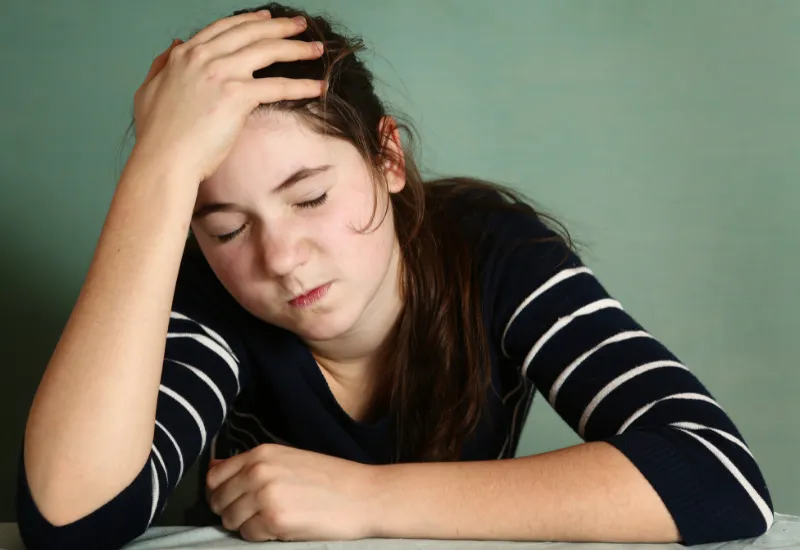Every child goes through certain changes in their body as they grow older. These specific changes are prominent when puberty hits. Puberty can occur around age 11 in girls and age 12 in boys. This can happen earlier or late for some as there is no exact age for puberty to occur. Puberty can be a tough age to handle for both children and their parents.
Parents need to be very supportive during this period as most children are unaware of the changes happening to their bodies. During these years, fluctuations in hormonal levels can affect their physical and mental health. Lack of support or understanding from parents during these years may cause further stress and anxiety in a child. Therefore both parents and children must be aware of the changes that occur during puberty.
Signs of puberty in girls
Girls experience puberty a year or two earlier than boys. The average age range of puberty for girls is 10-13 years. The signs of puberty in a girl include the following:
-
Breast development: This is usually the first prominent change that occurs in girls. Breast buds develop beneath nipples, and they continue to enlarge for the coming 3-4 years. They may be tender in the initial years but become normal as they grow. Breast size and shape may vary in different girls.
-
Pubic hair: Hair begins to appear in the pubic region. Pubic hair is thin initially but becomes more coarse and dense in the following years. They may spread towards the inner thighs and upwards towards the navel.
-
Armpit and body hair: Girls may also notice course hair in their armpit region and on the rest of their body. Hair is more pronounced on arms and legs. Light hair may also be seen above the upper lip. The texture and thickness can vary based on genetics and ethnicity.
-
Periods: This is a significant change in girls that occurs during puberty. The beginning of periods or menses indicates the beginning of the normal reproductive cycle. Girls uneducated on the subject may develop stress or anxiety when their first period occurs.
-
Uterus growth: The uterus grows bigger in size when puberty hits. In the following 3-4 years, the development of reproductive and genital organs completes.
-
Vaginal discharge: It is common to notice a white discharge from the vagina as a girl hits puberty. It may occur in some and may not be prominent in others.
-
Acne: Due to fluctuations in hormonal levels, acne can develop on the skin of the face or other regions. It may be present as whiteheads, blackheads, nodules, or papules. Acne tends to flare up during menses or periods of stress. It can be a factor for social anxiety among young girls.
-
Growth spurt: Girls begin to grow in height, usually after 12. It continues for the following years till around the age of 18. Changes in height mainly depend on genetic factors, i.e., taller parents are likely to have taller daughters.
-
Weight gain: It is normal for girls to gain weight during puberty, especially around the hips, thighs, and buttocks. Other factors such as diet and physical activity may also influence this change.
-
Mood changes: Girls may experience recurrent changes in their mood from day to day. This can also be influenced due to various external factors.
Signs of puberty in boys:
-
Growth of genital organs: The initial sign of puberty in boys is that their testicles and scrotum grow in size. In the following years, the penis also continues to grow and enlarge. The scrotum may get darker in color during the late stages of puberty.
-
Pubic and body hair: Thin hair may start to develop on the base of the penis in the initial years. As time passes, pubic hair becomes more coarse and thick. Boys have much dense pubic hair compared to girls. Hair also develops under armpits sometime later and on the rest of their body. Facial hair becomes more pronounced in the late stages of puberty. Increased sweating is also noticed.
-
Breast tissues: Boys also develop thin layers of breast tissues under their nipples during puberty. These tissues fade away over time with further growth.
-
Voice changes: After hitting puberty, boys experience changes in their voice quality. Their voice may crack during the initial years and become deeper over time.
-
Wet dreams: It is also frequent for boys undergoing puberty to experience wet dreams at night during which they ejaculate. This is involuntary and occurs due to changes in hormones.
-
Growth spurt: Boys begin to grow in height, usually after 11 to 13 years of age. Growth spurt in boys is faster and lasts longer in boys than girls. They also become more muscular during this period.
-
Acne: Boys may develop acne during their puberty years. It can aggravate with stress or other relative factors. It may present as whiteheads, blackheads, nodules, or papules.
-
Mood changes: It is also frequent among young boys to experience mood changes due to fluctuating hormonal levels. It may be influenced by external factors as well.
Both boys and girls need guidance and support during these years of change. Parents often complain that their child has become more moody or rebellious during this stage. But it is essential to understand that most of the physical and emotional changes experienced during puberty are normal. Cooperation and understanding by parents can make this phase easier for most children. If any abnormal changes are noticed, it is best to seek medical advice.
Visit cura4u for further details on medical conditions, diagnostic tests, and online consultation. Register yourself and your loved ones today for optimum healthcare services!












